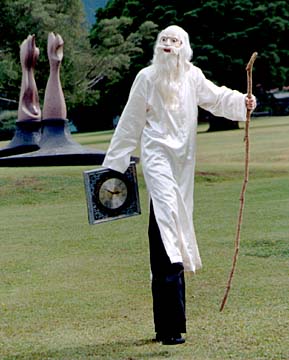


The dawn of the new millennium has given teachers a learning tool to inspire reflection, creativity and imagination. Students across the islands are linking subjects to the turn of the century as they relate to the past, live in the present and plan for the future. Time capsules, scrapbooks, dramatizations and art projects require research, analysis, problem solving and thought. The Star-Bulletin went into the classrooms to see what students of various levels are doing -- from elementary school, to middle school, to high school and college.Here's a look at one of the projects.

Windward Community
College project ‘opened
students’ minds’A costumed 'Millennium Timewalk'
By Eloise Aguiar
gives 'a wider perspective' on history's
great events and figures
Star-BulletinIt was billed as Millennium Vision Day.
On Oct. 13, Windward Community College students and faculty dramatized significant events of the last 2,000 years, trekking down a "Millennium Timewalk" in costume. They also began contributing to a time capsule that will be placed in the campus' Humanitarian Building, now under construction.
"I wanted the Timewalk to be educational, entertaining and whimsical," said WCC librarian Elizabeth Ashley, who was responsible for researching the 145 items and events ultimately highlighted. "The whimsical were meant to wake people up and catch their attention."
For instance, according to plaques installed during the walk: Toilet paper was manufactured in the United States in 1857. A public bathroom with flush toilets opened in Rome in 70 A.D. The Chinese invented playing cards in 969 A.D.
On the Timewalk, students and instructors became century guides, dressing in period costumes or taking on the personas of historical figures. As interpreters they were responsible for researching their time period to answer questions.
WCC student Jennifer Mochizuki, 17, played Sacagawea, a female Indian guide and interpreter for the Lewis and Clark expedition. She immersed herself in the project after being chastised by her grandfather for not learning about the famous explorers in high school.
"I said, 'Papa, they don't teach us that kind of stuff,'" Mochizuki said. "I was in class every day, and I did not know about half of the stuff he was telling me about. I felt so shame (from his criticism)."
But that shame didn't keep her from doing the project -- and Mochizuki said learning of Sacagawea's bravery, loyalty and strength was awe-inspiring.
Paul Field, WCC instructor and the project's adviser, said other guides also didn't know much initially about their characters. But the process was exciting because the students did their research and enjoyed role-playing.
Century guides included the last Korean queen, Madame Pompadour, a French peasant, Shakespeare, a Chinese paper maker, a Japanese court lady, Marco Polo and a Mayan princess.
"The project opened students' minds to the fact that there were a lot of different things going on in different parts of the world at the same time," Field said.
Theresa Schmidt, an 18-year-old WCC student, agreed. She represented Mohammed the prophet's wife and took part in the project to earn extra credit for a drama class. Besides the research she did for her character and time period, she learned from other guides.
"(The event) has given me a wider perspective," Schmidt said. "I'm sure for everyone it was a learning experience."
Another student has decided to change his field of study because of the WCC event, and due to professor Jim Dator's challenge to think about the future and what it should look like.
Fala Pula-O'Rourke, 21, said his initial interest had been in social work, but now he'll switch to a computer science program.
"I signed up to be a social worker because some of my friends said it was easy," Pula-O'Rourke said.
"But after (Dator) mentioned that it's going to be a computer world, I thought: 'I'm a computer guy. If it's going to be a computer world, I'd better jump on right now, get a piece of the pie.'"
James Matichuk, a second-year student, said the event was thought-provoking, and he often wonders about his future, hoping it will be in Hawaii.
Summarizing the event, he said: "It drives the point home that the choices we make affect what happens in the future, and we've got to be responsible. If you keep that in mind, it should make you more purposeful in your actions."